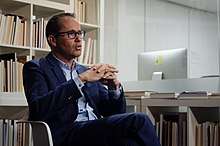David Jiménez (journalist)
David Jiménez (born 1971) is a Spanish journalist and author, who worked as long-term correspondent in Asia for the newspaper El Mundo. In May 2015 he became editor of El Mundo, but was dismissed from that post in May 2016. He has written several books.

Biography
Jiménez was born in Barcelona on 11 January 1971. He graduated in journalism from the University of Barcelona and began work in 1994 for El Mundo, working as an intern on its Madrid and Society sections. In October 1998 he became the paper's first correspondent in Asia, remaining there until 2014 and covering the conflicts in Afghanistan, Kashmir and East Timor.[1] His coverage of Tibet induced the Chinese government to ban him from returning to that country. He reported clandestinely from North Korea and was the only Western reporter to stay in Fukushima through the nuclear disaster of 2011.
Jiménez' reports have been published in The Guardian, The Toronto Star, The Sunday Times, and Esquire magazine. He has appeared on the CNN and BBC television channels.
Editor of El Mundo
On being awarded a Nieman scholarship from the University of Harvard in 2014, he worked for a period at MIT Media Lab, investigating digital challenges to the press. He returned to Madrid to take over the editorship of El Mundo, replacing Casimiro García-Abadillo, with the task of bringing the paper out of its period of crisis and leading its digital transformation.[1][2][3]
His dismissal as editor became known on 25 May 2016,[4][5] and followed his appearance on a talk programme on Onda Cero, in which he asked the presenter whether they accepted "ex-editors".[6] His termination took place during a serious crisis for the newspaper and its owner Unidad Editorial, which was undertaking its third round of redundancies since 2009. The workforce were taking intermittent strike action in protest against a proposal to dismiss over 160 staff, a plan that Jiménez had opposed.[4] Jiménez attributed his dismissal to his resistance to pressures that would have compromised the independence of the newspaper, and in June 2016 he was the first editor of a Spanish newspaper to take advantage of a constitutional "conscience clause" intended to protect the freedom of the press, when he denounced Antonio Fernández-Galiano, the president of Unidad Editorial.[7]
Publications
His published works include his first book, Hijos del monzón ("Children of the Monsoon": Kailas, 2007), which won the award for the best Spanish travel book, and has been translated into English, German and Italian. He has also published a novel, El botones de Kabul ("The Bellhop of Kabul": La Esfera, 2010), based on his experiences covering the Afghan war, and El lugar más feliz del mundo ("The happiest place in the world": Kailas, 2015).[8]
References
- "El Consejo de Administración de Unidad Editorial nombra a David Jiménez director de EL MUNDO", El Mundo, 30 April 2015.
- "Unidad Editorial releva a García-Abadillo al frente de ‘El Mundo’", El País, 30 April 2014.
- "David Jiménez, nuevo director de 'El Mundo' tras la destitución de García-Abadillo", El Periódico de Catalunya, 1 May 2015.
- Unidad Editorial cesa a David Jiménez como director de El Mundo, El Confidencial, 25 May 2016.
- "El Mundo destituye a David Jiménez como director un año después de su nombramiento", ABC, 25 May 2016.
- "Carlos Alsina a David Jiménez: "No estás aquí por ser director de El Mundo, así que te espero la próxima semana"". Onda Cero (in Spanish). 25 May 2016.
- "David Jiménez denuncia presiones de Galiano y demanda a Unidad Editorial". PR Noticias (in Spanish). 2 June 2016.
- Libros de David Jiménez (personal blog), accessed 25 May 2016.